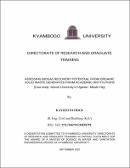| dc.contributor.author | Kayizzi, Patrick | |
| dc.date.accessioned | 2023-02-08T10:09:16Z | |
| dc.date.available | 2023-02-08T10:09:16Z | |
| dc.date.issued | 2022-09 | |
| dc.identifier.citation | Kayizzi, Patrick(2022) Assessing biogas recovery potential from organic Solid waste generated from academic institutions (case study: Islamic university in Uganda - Mbale city) | en_US |
| dc.identifier.uri | https://hdl.handle.net/20.500.12504/1198 | |
| dc.description | xv,127p.:ill (some col) | en_US |
| dc.description.abstract | Resource recovery is contingent to the circular economy and the core intention is to
replace the norm of largely linear economy of take make and dispose with one where
resource circulation and disposal is fostered at high value. One of the current trending
strategies in waste minimization is resource recovery such as biogas given its undisputable
benefits. Education institutions are considered as congregated communities that have
significant social, economic and environmental impact on the environment. like local
authorities, these institutions experience challenges of provision of satisfactory social
services such as managing solid waste. Minimal efforts have been invested in carrying out
research in waste management practices in school settings most especially establishing
the potential of biogas recovery that can contribute towards reduced impact to the
ecosystem. This study was therefore focused on exploring the biogas potential from solid
organic waste generated from higher academic institutions in Mbale Municipality. The
study first looked at solid waste management practices in sampled academic institutions
and their respective main source of fuel for cooking; a checklist was prepared and 26 out
of 36 sampled institutions willingly provided access to their premise. From the data
gathered, 65% of the 26 institutions practiced onsite waste disposal mainly dumping in
pits and burning while the other schools disposed of to the main landfill; 25 out 26
institutions utilized wood biofuels for cooking while 1 out of the 26 used electricity; none
of the schools practiced resource recovery. A detailed assessment was then undertaken
at Islamic University in Uganda to establish the quantity and composition of the waste
generated within two distinct periods of the semester: one at the beginning (February) that
represented the dry weather conditions and at the end of the semester (November) that
represented the wet season. Results indicated that foliage pruning contributed the highest
percentage of waste generated followed by kitchen waste while paper waste registered the
least percentage contribution by both volume and weight; It was also noted that more
waste generation was experienced during the wet season; hourly waste collection
indicated peak collection/ generation between 1000-1200 while least collection was
between 1200-1400hr with kitchen waste dominating between 0800-1000hrs and 1600-
1800 while foliage pruning dominated between 1000-1200hrs and 1200-1400hrs
respectively. Biogas resource potential was investigated using a single stage biogas setup
where co-digestion of the organic solid waste was used as substrate; eight sets of
experiments were conducted with two identical sets per ratio for (paper, kitchen and grass)
and 25% cow dung inoculant by weight of the total substrate weight under mesospheric
conditions. Results indicated a high methane composition of 33% and a relatively low
percentage of 13% for ratios of 1:19:7 and 1:5:7 (for paper: kitchen: grass) respectively.
The potential of biogas in solid organic waste gave an indication of a virgin opportunity
to explore harnessing resources from the organic waste generated from academic
institutions that will in return provide an alternative for safe solid waste disposal as well
as harnessing nature gas for cooking and manure for soil stabilization for ecosystem
degradation mitigation.
Key Words: Resource recovery, Biogas, Solid Organic Waste, Methane | en_US |
| dc.language.iso | en | en_US |
| dc.publisher | Kyambogo University[unpublished work] | en_US |
| dc.subject | Resource recovery. | en_US |
| dc.subject | Biogas. | en_US |
| dc.subject | Organic Solid waste. | en_US |
| dc.subject | Methane. | en_US |
| dc.title | Assessing biogas recovery potential from organic Solid waste generated from academic institutions (case study: Islamic university in Uganda - Mbale city) | en_US |
| dc.type | Thesis | en_US |

